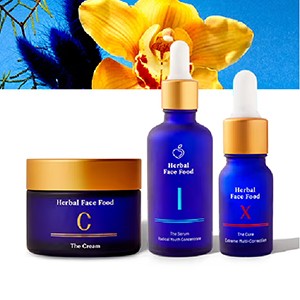Gut health is our forever hot topic. Donna Gates, M.Ed., ABAAHP of Body Ecology is one of our all-time top pros on foods that promote gut health and here she educates us on a few of her own go-to’s. Don’t miss her insightful note on collagen and bone broth — a great reminder that not every health food is one-size-fits-all…
First, Why Is Gut Health So Important?
Prevention and healing begin in the digestive tract. Removing foods that weaken the immune system and make you an easy “host” to infections is a vital first step if you want to create a thriving inner ecosystem. The goal is to starve the “bad” microorganisms that could be feeding a systemic infection or causing chronic inflammation.
Your body’s systems are all interconnected. If your digestive system doesn’t absorb the proper nutrients, stimulate the proper enzymes, or “unlock” proper detoxification, it can create suffering throughout all the other systems in the body. The more efficient your gut is performing, the more likely you’ll be at your best.
Here are just some symptoms that may result from an unhealthy or imbalanced digestive system:
+ mood disorders
+ anxiety
+ inflammation
+ celiac
+ food allergies
+ weight problems
+ immune deficiencies
+ blood sugar irregularities
+ acne and skin disorders
+ candida
+ fibrosis
Before we dive into foods that promote gut health, it’s helpful to mention that intermittent fasting can also play a key role in obtaining excellent gut health. By providing your body with an eight-hour eating window, many studies show key changes in digestion, glucose levels, genetic expression to support longevity, cellular repair, inflammation markers, and more.
9 Foods That Promote Gut Health
Below are primary gut health foods that many of us can benefit from including in our diets:
collagen-rich Bone broth | Made of collagen, which has shown benefit to gastric ulcers, bone broth may improve digestion as it contains glutamine and important metabolic fuel for cells in the small intestine. Bone broth is full of minerals that can strengthen the immune system.
Even though bone broth is praised as a great gut health tool, if you have candida or a yeast issue in the gut, watch for oxalates from collagen in bone broth.
While bone broth can help the gut heal, excessive collagen in the diet combined with an overgrowth of Candida can team up, generating a toxic accumulation of oxalates in your body. Candida yeast produces a precursor to oxalates, and it has the ability to transform collagen into corrosive oxalate crystals.
Additionally, some who are genetically predisposed to anxiety or depression can become more anxious and/or depressed when they have collagen because it does not contain tryptophan. Tryptophan and serotonin levels are linked.
If you find yourself experiencing mood changes, consider adding in some tryptophan with your collagen. Certain genes may also create a negative response to the collagen unless you fix the cofactors.
Protein | You need at least 30 grams of usable body protein every day in order to build or repair muscles, bones, tissues, hair, organs, etc. Fermented spirulina is a nutrient dense, detoxifying superfood that many don’t realize is an excellent source of protein, providing all 8 essential amino acids.
When spirulina is fermented, it is that much easier to digest. Verify the source of your spirulina to ensure its purity as this superfood will soak up any heavy metals and toxins around where it was sourced.
Leafy Greens like dandelion greens are rich in phytochemicals and carotenoids that have cancer protective properties, are high in vitamin and minerals including potassium, vitamin C, vitamin K, iron, calcium and magnesium.
Broccoli contains sulforaphane which can improve vitamin D absorption to aid in immunity, fighting inflammation and cancer, increasing bone mass. Contains glucosinolates, sulfur containing compounds, which when broken down into metabolites, may help cells from being damaged and also have an antibacterial effect as well.
Healthy Fats support cognitive function, help to create hormones in the body, maintain the structure of cell walls, support energy production and the prevention of neuro-degeneration. Healthy fats also protect against inflammation and oxidative stress. Essential fatty acids contribute significantly to adrenal recovery.
Fermented Foods support your immune system, improve digestion and can support nutrient absorption. Fermented foods can also lessen cravings for sugar and carbohydrates in processed foods and help to build our inner ecosystem. Consider adding at least 1 heaping tablespoon of fermented foods to every meal. These can include fermented vegetables, like cabbage (sauerkraut) or probiotic drinks when you’re on-the-go.
Homemade coconut kefir The difference between the kefirs that I recommend and most yogurts are that they contain different strains of beneficial bacteria. Kefir contains several major strains of friendly bacteria not commonly found in yogurt and also contains beneficial yeasts which can potentially fight destructive pathogenic yeasts in the body.
Sea vegetables | Helps lower cholesterol, detox the body from heavy metals and environmental pollutants, helps control the growth of pathogenic viruses, bacteria and candida, help to balance thyroid function, fights constipation, prevents aging and chronic disease.
Sea salt | Sea water contains minerals such as ionized sodium, magnesium, calcium, potassium, and selenium, plus many trace elements such as copper, iron, zinc, manganese, and chromium. The human body uses the minerals and trace elements in sea salt to create electrolytes, maintaining the “internal ocean” which is vital to the proper functioning of every system in the body.
6 Supplements For Gut Health
Digestive Enzymes | Aids with abdominal bloating and discomfort after meals, indigestion, gas, candida overgrowth. There are different types too depending on your body’s needs (full spectrum, digestive help for those who can’t process dairy and protein well and also for those with issues of the small intestine).
fulvic and humic minerals help to nourish thyroid and adrenals, detoxify, reduce signs of aging, build immunity and chelate heavy metals. Fulvic and humic minerals have also been shown to reduce gray hair in women.
Probiotics | Cleanse the liver, support clearer skin, make hair and fingernails stronger and support longevity. The best probiotic strains help make natural folate and increase good bacteria (improving digestion), including lactobacillus plantarum and bifidobacteria—and if you really want to go one step further, add in hearty prebiotics to feed the good bacteria.
Dong Quai | Studied to helps balance estrogen levels, cleanse the blood, treat iron deficiency, enhance female fertility, increase circulation and improve complexion.
immune-supportive Herbs | Herbs such as turmeric root, oregano leaf, pau d’arco bark, garlic bulb, peppermint leaf, fennel seed, echinacea root and rosemary cleanse the body, are anti-fungal, anti-viral, and immune-boosting, filled with powerful antioxidants to help control pathogenic bacteria.
Reishi Mushroom | Promotes longevity and cardiovascular health, boosts immune system, regulates blood sugar and is antiviral.












